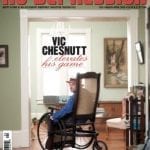Crooked Fingers – Dignity in the arts
In the beginning, Bachmann — who had recorded two more-or-less solo instrumental albums during the Archers days, under the name Barry Black (1995’s Barry Black and 1997’s Tragic Animal Stories) — wasn’t so clear about his vision of what Crooked Fingers would be. “I didn’t want it to be a reaction to or against my past,” he explains. “I wanted to just let the Archers go, and go forward. Sometimes you slip, and think, ‘Oh, I don’t want to be in another loud rock band.’ But I would be in another loud rock band if that’s where the impulse took me.”
One thing was certain: “I wanted, and still want, to write songs that are going to last a long time. If you listen to ‘Web In Front’ [from Icky Mettle], that sounds like the early ’90s. Not that that’s bad. But ‘New Drink For The Old Drunk’ [from Crooked Fingers] doesn’t sound like it was written in 2000. It sounds like it could have been written 20 years ago.”
He divined the name for his new project via similar impulses, appropriating his grandfather’s CB handle. “He was passing away at the time, and I thought it would be cool to name the band that. I liked how it sounded. I like to think of things long-term. If Crooked Fingers is around 30 years from now, it will have a quality like ‘The Mekons’ does. It’s not a stupid trendy name. It should age well.”
Thus far, Crooked Fingers has matured admirably. After relocating from the NC Triangle to Atlanta in 2000, Bachmann wisely elected to keep his initial efforts on a modest scale. He went with a small label, Warm Records, for Crooked Fingers’ debut, to minimize fanfare; he didn’t want anyone to plastering a “featuring former members of Archers Of Loaf!” sticker on his new CD. “I wasn’t ashamed of the Archers, but I knew Crooked Fingers was very different,” he clarifies. “I wanted to keep making music. I wanted to keep writing songs. That’s all I knew. When I first started playing this music, I thought that there would be a lot of people who liked Archers Of Loaf but didn’t like Crooked Fingers. And vice-versa. And I was right.”
In 2002, Bachmann moved up a notch and signed with Merge. His first release for the label, Reservoir Songs, featured five covers, low-key but radical interpretations of songs made famous by Kris Kristofferson, Johnny Cash, Prince, Bruce Springsteen, and, most notably, Queen and David Bowie (“Under Pressure”). The Crooked Fingers’ version of the last sidesteps the highly affected — and affecting — vocal performances of Bowie and Freddie Mercury, replacing them with a hushed intensity that proves surprisingly moving. (Bachmann has temporarily shelved plans for additional volumes of Reservoir Songs, but he hopes to start posting unreleased covers for download at the Crooked Fingers website soon.)
Tackling a quintet of songs by such iconic figures not only reiterates Bachmann’s determination to “kick some ass,” but underscores his own strengths as an artist. Lend an ear to “Twilight Creeps” or the rocking “Coldways” on the new disc; these are the sort of soon-to-be-classics one imagines blaring from the car radio in scenarios painted by a Springsteen or John Mellencamp song. When Bachmann measures the level of greatness he expects from own work, he does so against impressive predecessors and contemporaries: Townes Van Zandt, the aforementioned Thompsons, Van Morrison, Stephin Merritt (Magnetic Fields).
Like those masters, Bachmann’s music increasingly leaves one with the impression that his primary gift is the ability to channel some higher inspiration and distill it into a unique, if mercurial, musical and lyrical aesthetic. “When you write a song,” he reckons, “you have to ask yourself, ‘Why am I doing this?’ Are you just doing it for yourself? Or do you do it to serve the world, to help people make it through their day? In the Archers, I didn’t care what other people thought; I was just making music for myself.”
And now? “It’s the polar opposite,” he insists. “That’s just a spiritual thing people develop. When I got my head around the idea of ‘Music Should Serve Some Purpose,’ that was very liberating. Not to sound pretentious, but maybe someone will listen to my music and, in some simple way, it will help them.”
Beyond an upcoming tour, Bachmann is uncertain of what the future holds for Crooked Fingers. “I have no idea,” he says. “The next record might be a concerto for four tubas and a squirrel.” The band could swell to ten members (the current incarnation is a quintet: Bachmann, Meyerratken, multi-instrumentalist Barton Carroll, drummer Dov Friedman, and trumpet player Jason Parker), or shrink to just Bachmann and his guitar.
“It’s good to not know where you’re going, in terms of creativity,” he concludes, a smile lighting up his face. “Nothing is predetermined.”
ND contributing editor Kurt B. Reighley writes the “Border Radio” roots & Americana column for Seattle alt-weekly The Stranger. He is currently working on a new book about bacon. Mmmm…bacon.




